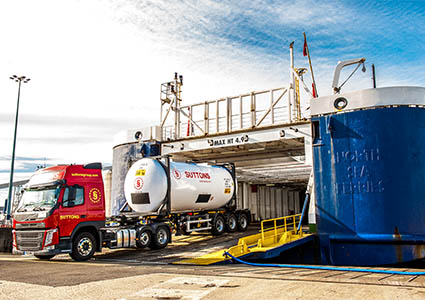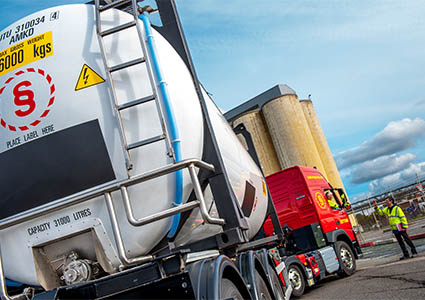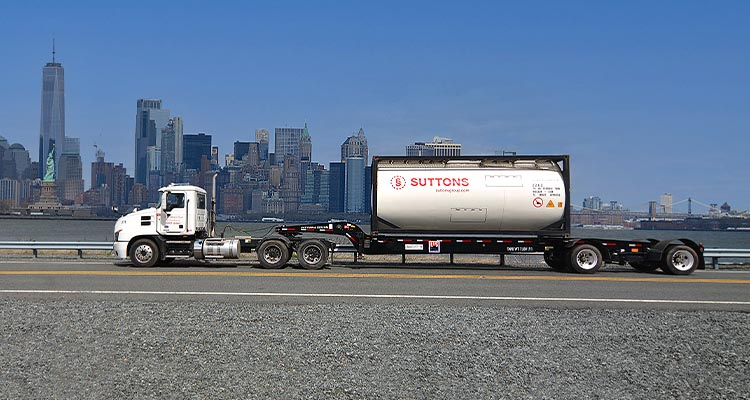Jonathan Mackie from Suttons International describes how one family transformed global logistics for the better
Nearly a century ago, equipped with only a single horse and a cart, Alf Sutton created his own business, Suttons International (Suttons). Over the course of its rich history, the family-owned business gradually went on to acquire tens of thousands of specialist haulage vehicles, enabling it to constantly deliver on time across the UK and internationally. Today, it operates a global logistics service, specializing in the chemical, gas, fuel, and food sectors. Synonymous with outstanding safety and customer service, the Sutton name has since evolved to encompass a wide variety of services, including all aspects of tank container, road tanker, and multimodal services, as well as expert supporting services such as fleet management and on-site logistics. Global Commercial Director, Jonathan Mackie, reveals more details.
 “Still wholly family-owned to this day, Suttons was founded in 1926 in St Helens, England,” he opens, before recounting the organization’s evolution through time. “Suttons then expanded into more complex and niche markets, namely gas and chemicals, around Widnes and Runcorn, where the UK chemical industry first grew and developed. In the late 1970s, the business grew substantially not only through acquisitions but also predominantly through organic growth, leading it to increasingly trade internationally.”.
“Still wholly family-owned to this day, Suttons was founded in 1926 in St Helens, England,” he opens, before recounting the organization’s evolution through time. “Suttons then expanded into more complex and niche markets, namely gas and chemicals, around Widnes and Runcorn, where the UK chemical industry first grew and developed. In the late 1970s, the business grew substantially not only through acquisitions but also predominantly through organic growth, leading it to increasingly trade internationally.”.
Jonathan indicates that the acquisition of VTG in 2021 propelled Suttons to its current scale, as the company now operates in many countries around the world. “Our first office in the US was opened in 1983, followed by expansion in continental Europe throughout the 1980s and early 1990s, and new offices in China and Japan, in 1997 and 1998 respectively. In the Americas, we boast headquarters in New Jersey, facilities in Houston, Texas, an office in São Paulo, Brazil, and through an agent agreement with a joint venture partner, a facility in Buenos Aires, Argentina. Meanwhile, in Europe, we have offices in Antwerp, Hamburg, Rotterdam, and Ludwigshafen. Recently, we have expanded into the Middle East, a region previously handled by our European team. We have also enhanced our presence in Asia with offices in Singapore, Malaysia, and Thailand, as well as facilities in Shanghai and Tokyo,” he enlightens.
A diverse portfolio
With such an impressive geographical presence, Suttons is empowered to deliver its services more effectively to a wider range of clients. Jonathan explains that Suttons primarily transports bulk liquid chemicals and gases contained within tank containers. “Moreover, we manage logistics directly for our customers, utilizing our fleet of approximately 14,000 tanks to move their products worldwide every day. Aside from gases and chemicals, we ship all resources necessary to create products that are essential to society. These include medical propellants for inhalers, soil emulators, fertilizers, electrolytes for powering electric vehicles and their batteries, paper products, waterproof fabrics, and biodiesel feedstocks.
“Another important aspect of our operations is our go-to-market service lines. This includes our spot business, within which we handle individual shipments on a spot or case-by-case basis as customer needs arise. We also deliver on a tender basis, with certain clients allocating us set annual market shares. Lastly, we offer contract tank options, leasing tank containers directly to customers so they can manage the transportation of their own products independently. Alternatively, we provide a fleet management service, where we manage their owned tanks and handle all the logistics for them,” he adds.
Embracing technology
To deliver its complex suite of services to the same high standard across each of its international hubs, Suttons strives to optimize its technologies and resources. “We have our own Enterprise Resource Planning (ERP) system, which we are in the process of refreshing. It enables us to fully manage the end-to-end process of our business, from the origination of a quote to the onboarding and operational management of a project. To further improve our efficiency, we have developed a range of operational procedures and policies and boast an in-house Lean Six Sigma team. This team monitors all our business processes and procedures, ensuring they are correctly implemented and eliminating any waste or inefficiency they may cause. As a result of their work, we are able to drive improvements in service standards and productivity.
“We have our own Enterprise Resource Planning (ERP) system, which we are in the process of refreshing. It enables us to fully manage the end-to-end process of our business, from the origination of a quote to the onboarding and operational management of a project. To further improve our efficiency, we have developed a range of operational procedures and policies and boast an in-house Lean Six Sigma team. This team monitors all our business processes and procedures, ensuring they are correctly implemented and eliminating any waste or inefficiency they may cause. As a result of their work, we are able to drive improvements in service standards and productivity.
“Since we work with a wide range of shippers globally to move our tanks on their vessels, our supply chain is extensive. Thus, we utilize our Lean Six Sigma techniques to monitor the performance of our shipping partners by comparing estimated transit days to actual transit days. Doing so enables us to forecast transit time and provides predictability around our operational performance. Additionally, we have bought over 200 depot facilities around the world, which we leverage to store, clean, and maintain our tanks. Likewise, these depot facilities are also managed using sophisticated performance metrics. We assess the time taken from a tank entering their facility until it becomes available again, and we closely monitor all performance metrics, with a particular focus on tank turnaround time. All these components are integrated and complemented by our business processes which are designed and developed using Lean Six Sigma techniques,” informs Jonathan.
Extensive collaboration with shipping partners is key to Suttons’ business. Jonathan concludes with what makes these relationships successful. “In all our commercial agreements with partners, we ensure that risk and responsibility are allocated correctly. We value honesty and transparency in our relationships and work on an open-book basis with our partners and customers, granting them access to our cost base and margins.” The trust that results from this transparency enables strong collaboration, particularly in overcoming issues such as rising costs.
